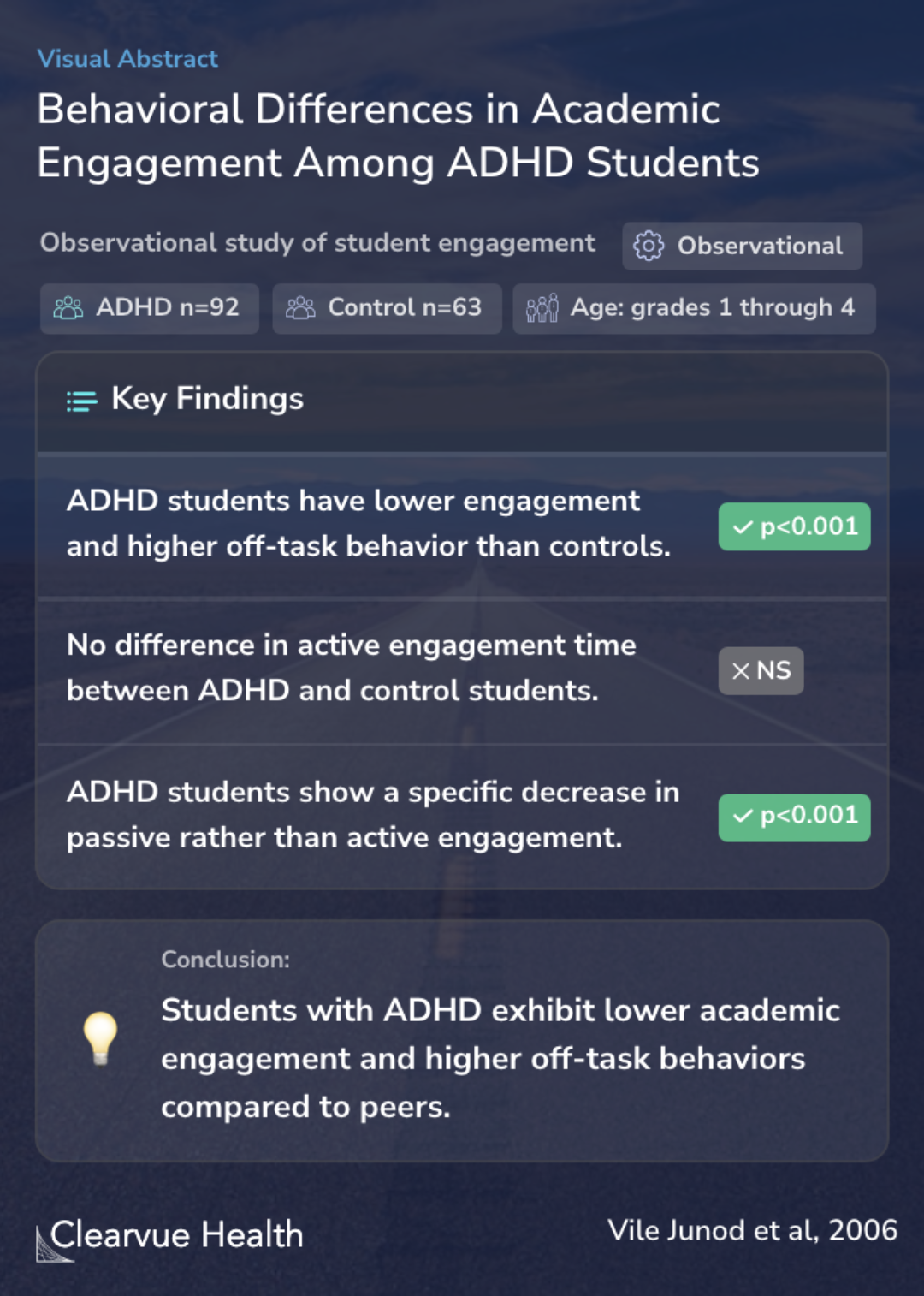Classroom observations of students with and without ADHD: Differences across types of engagement
Behavioral Differences in Academic Engagement Among ADHD Students
Vile Junod, R. E., DuPaul, G. J., Jitendra, A. K., Volpe, R. J., Cleary, K. S.

Objectives
The study focused on observing how students with attention-deficit hyperactivity disorder (ADHD) behave during classes, especially in math and reading. The main goal was to see how their behavior affects their involvement in learning activities.
The current study examined the behaviors related to academic engagement exhibited by students with attention-deficit hyperactivity disorder (ADHD) during instruction in math and reading.
Methods
The research involved 155 young students from the first to the fourth grade. This group included 92 students diagnosed with ADHD and 63 who did not have ADHD, serving as a comparison group. The methods used in the study were primarily observational, focusing on how these students engaged during school lessons.
A total of 155 students (92 ADHD, 63 recruited controls) in grades 1 through 4 participated in the study.
Results
The findings of the study indicated that the students with ADHD were generally less engaged in academic activities compared to their peers. They were more likely to exhibit behaviors that took them off task. Notably, there was no significant difference in the amount of time students with and without ADHD were actively engaged in learning. However, the students with ADHD showed a particular decline in passive engagement—like listening or watching quietly—compared to the control group.
Results revealed that students with ADHD exhibited statistically significant lower rates of academic engagement and higher rates of off-task behaviors than recruited controls and randomly selected peer comparisons. Specifically, students with ADHD exhibited statistically significant lowe...
Evidence Comparison
According to comprehensive guidelines on ADHD management, a blend of FDA-approved medications and behavioral interventions like Parent Training in Behavior Management (PTBM) and behavioral classroom interventions are recommended for school-aged children. This is to ensure that children with ADHD can better manage their symptoms and potentially improve their academic engagement and reduce off-task behavior
However, despite these interventions, the study shows that ADHD can significantly impair a student’s ability to engage in academic activities, which reinforces the need for such tailored educational plans and interventions. This corroborates with current approaches where comprehensive treatment plans including medications and behavioral therapies are seen as essential in helping these students navigate their educational journey effectively.
Conclusions
Students with ADHD are often less focused and engaged in school compared to their classmates without ADHD.
Implications for research and practice are discussed.
Key Takeaways
More Articles
For those interested in further exploring interventions for ADHD within educational settings, the article by Mikami et al., titled "A randomized trial of a classroom intervention to increase peers' social inclusion of children with attention-deficit/hyperactivity disorder," presents compelling evidence on how social inclusion programs can enhance the peer relationships and overall school experience of children with ADHD. This study is particularly relevant as it builds on the understanding that improving the social dynamics in a classroom can lead to better academic and social outcomes for students with ADHD.
Additionally, exploring how ADHD subtypes affect academic performance could provide deeper insights into tailored educational interventions. An undefined source article discusses the cognitive and behavioral challenges faced by children and adolescents with different ADHD subtypes, emphasizing the varied impact on their school performance and behavior. This discussion is crucial for educators and parents in understanding and managing the diverse needs of students with ADHD across different stages of their education.